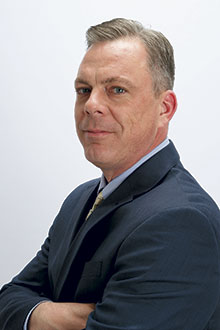For some, the foodservice industry is more than a job — it's a lifestyle. This is true for Michael Wahl, who has worked in the restaurant industry since washing dishes in a military mess hall at age 13. Years later, he went on to serve as a district manager for a multi-unit quick-service chain.
 Michael Wahl"It was when I joined a broadline distributor that I met people on the equipment side of the business and was able to make the transition," says Wahl.
Michael Wahl"It was when I joined a broadline distributor that I met people on the equipment side of the business and was able to make the transition," says Wahl.
He has been a sales rep for TriMark SS Kemp for the past five years, serving a diverse clientele that includes healthcare operations, independent restaurants, regional chains and corporate dining accounts.
FE&S spoke to Wahl about problem solving, how he effectively keeps on top of projects and his attention to detail.
FE&S: What do you like most about working on design-build projects?
MW: I enjoy the partnership with my customers, because it's a true collaboration between myself, my team and the customer's vision. This creates a customer for life. It involves a lot of trust on everyone's part.
FE&S: You're known for your ability to solve customers' problems. How do you go about researching good solutions for them?
MW: I stay up on industry trends and attend a lot of training sessions. I also participate in manufacturer training sessions, read publications, network with people who've been in the industry for a long time and pay attention to what's happening in foodservice.
FE&S: What goes into writing a good equipment spec?
MW: It's all about identifying the piece of equipment that best suits a client's current and future needs. It's not only looking at the existing menu but also knowing the customer and how their menu will evolve over the lifetime of the equipment.
FE&S: When it comes to managing projects, how do you go about making sure that nothing slips through the cracks?
MW: The main thing is being involved in every aspect of the project, from the first meeting with the customer to looking at the menu to working with designers and the entire team. Constant communication is key, because if something goes awry, and I'm involved every step of the way, I can correct problems in a timely manner. Being forthright is also important. The customer may not always like what I have to say, but it will always be the truth.
FE&S: In addition to managing your own accounts, you are a resource for your fellow DSRs at TriMark SS Kemp, often training new team members. What has working with new team members taught you?
MW: Don't take anything for granted. The single most important thing you can do for customers is to have good product knowledge and be up on the industry. You don't need to know everything, but you should always know who to call for answers.
FE&S: How does your past experience in food sales and on the operations side of the business help you better serve your customers?
MW: I haven't forgotten where I came from. I remember thinking when working in the kitchen that there has to be a better way to do certain things. It helps knowing my way around the back of house and what customers are going through on a daily basis.



